Easy Finger Painting Ideas Paintings of a Sunflower
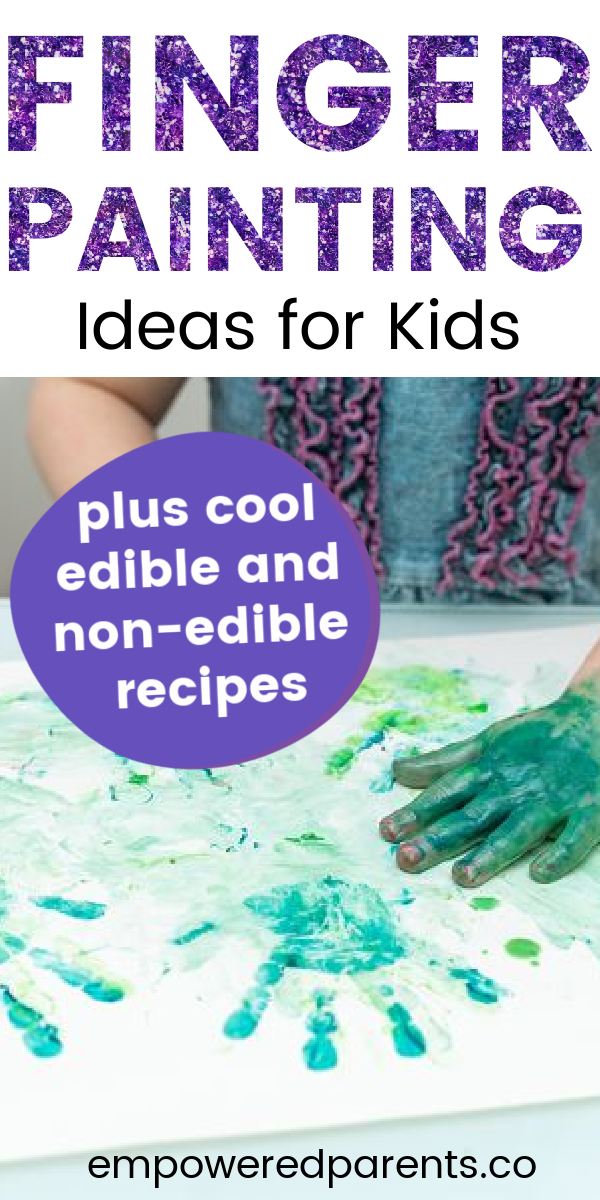
Besides offering a great deal of fun and freedom for young children, finger painting has therapeutic effects for kids. This type of painting is a wonderful form of messy play and it is great for developing fine motor skills. It also offers a wide range of possibilities for self-expression.
Introduce your preschoolers to finger painting art and watch the excitement that follows. Here are some fun finger painting ideas to try at home with your kids.
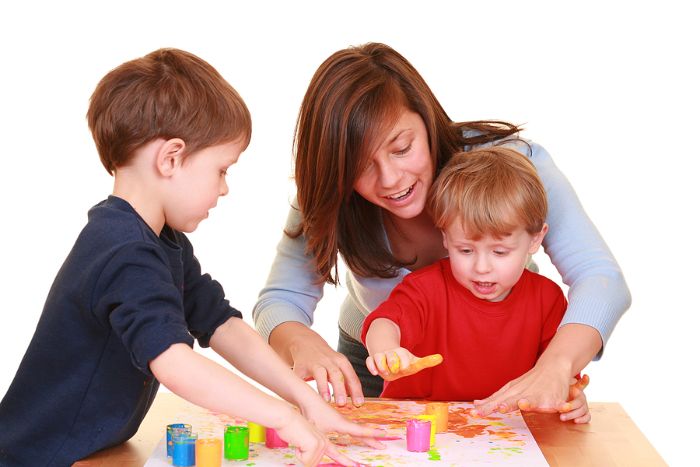
Finger Painting Ideas for Preschoolers
There are many different ways to finger paint – expose your kids to different techniques, types of paint and methods of painting. Here are some ideas.
Finger Painting Techniques
Young artists can use their fingertips, palms of hands, sides of hands, or even forearms and elbows to apply and move paint.
Your kids can paint any types of images they want, from letters, numbers, and shapes, to finger painting animals and other favourite designs.
They may use other tools, as well; the teeth of combs, for example, make interesting designs in the paint.

Finger Painting Methods
There are two common methods of finger painting art.
In the first, cover the entire sheet of paper with your chosen colour. Or mix two tints on the paper to form a new colour. Then use the fingers to "draw" the picture, such as a flower.
The white paper shows through, making the flower design, with the paint colour providing the background.
For the other method, dip fingers in chosen colours. Use the fingers almost as paintbrushes to apply and "draw" with the paints.
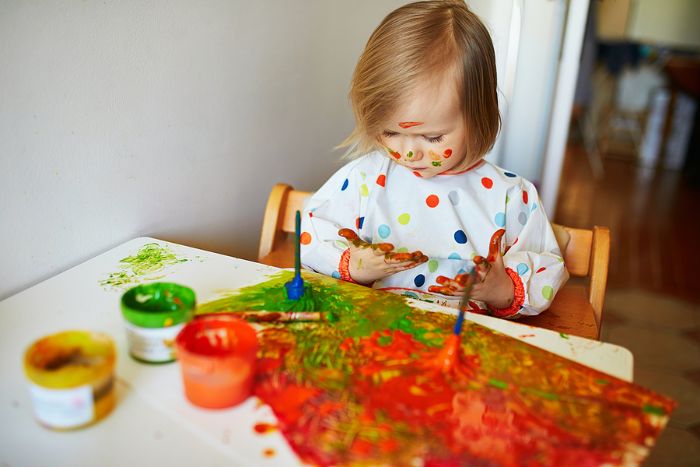
Papers for Finger Painting
Choose from a variety of surfaces and paint products when introducing finger painting to your child.
Heavy papers like freezer paper often work the best for finger painting and prevent the paint from soaking through.
You can also find paper made specifically for this purpose, which is resilient and nonabsorbent. Try dampening the shiny side of these papers with a wet sponge, first, when using the traditional, thick finger paints. This allows for easier spread.
You can also use other types of heavy paper or cardboard.
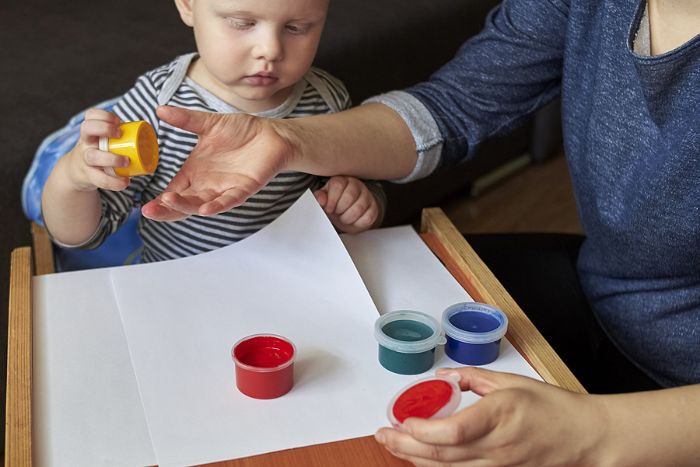
Finger Paints
Finger paint is quite thick and often comes in primary colours, which children can mix, right on the paper, to form secondary colours.
You can also use tempera paint for finger painting. This is a little thinner but often available in a wider assortment of colours.
When using finger paints with kids, be sure to choose non-toxic products. And check for egg-free bases, for kids with egg allergies.
Finger Painting with Water
To avoid a mess, especially for the very young, let them finger paint with water. Have a container of room temperature water handy for dipping fingers.
Water shows up well on large sheets of black or dark brown construction paper. Also try clean, dark green or black slates/chalkboards. Children see the designs made with their fingers until the water dries. Then they can start all over again!
5 Simple Finger Paint Recipes
Make the following paints at home. With the non-cook recipes, your children can even help with this stage of the process.
1. Cooked Finger Paint
Ingredients:
- cornstarch
- poster or acrylic paints
- water
- oil of spearmint, wintergreen, or clove (optional)
- Mix 45 grams (3 tablespoons) of cornstarch with 40 ml (3 tablespoons) of cold water in a small saucepan. Stir to make a smooth paste.
- Add 250 ml (1 cup) of boiling water. Stir quickly so lumps do not form.
- Stir until it thickens and looks translucent. If needed, cook over low to medium heat.
- Mix in 60 ml (1/4 cup) of cold water and scented oil if you are using some. These can help to preserve the paints, and they smell pleasant. Cover so the mixture is air-tight to cool.
- You can add colours to the liquid starch a few drops at a time right on the finger paint paper or in separate containers, one for each colour you want to make.
2. Non-Cook Finger Paint
Ingredients:
- white flour
- cold water
- tempera paint or food colouring
- Using a whisk, slowly mix 240 grams (2 cups) of white flour into 474 ml (2 cups) of cold water in a bowl.
- Divide into separate containers and add colours.
Optional: For a more textured finger paint, add some sand or salt, first, to the flour.
3. Sticky & Shiny Finger Paint
Ingredients:
- corn syrup
- food colouring
- Mix individual portions of corn syrup with chosen colours.
- Store in small zip bags or in air-tight containers.
This paint works well on heavy freezer paper. When the pictures have dried, they look very shiny!
4. Edible Finger Paint with Yogurt
Ingredients for each colour:
- Plain yoghurt (1/2 carton)
- flavoured gelatin powder (1/2 package)
- Mix ingredients in a bowl.
- Paint on paper plates or waxed paper.
5. Edible Whipped Cream Finger Paint
Ingredients:
- container of prepared whipped cream dessert topping
- food colouring
- Mix a drop or two of colour into portions of the whipped cream.
- Paint on paper plates or thick paper.
NOTE: The "edible" recipes are not meant to serve as a full snack. The benefit is that your children can safely sample for a taste.
While you have all these ingredients out and you're in the mood for having fun while making a mess, you may want to try these playdough recipes too.
Cleaning, Drying and Displaying the Finger Paintings
What happens after the paintings are complete? Consider the following options for cleanup and display.
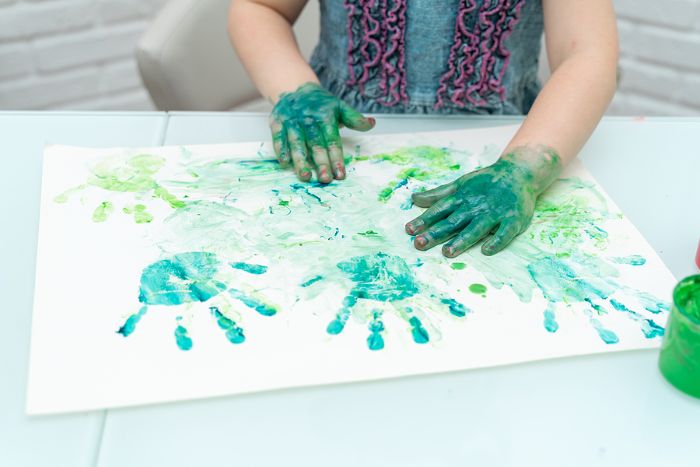
Cleanup
Many finger paints, purchased or made at home, contain colours that may stain. From little fingers, these eventually wash away. Tip: use hand-washing songs to help teach kids to do this properly.
Clothing may be a different story, depending on how soon the article is washed. Use aprons, paint smocks or old adult shirts for cover-ups.
Protect tables and floors with newspapers, vinyl tablecloths or inexpensive vinyl shower curtains. Throw them away or wipe them down when you are finished.
A few drops of liquid dish detergent added to paints before use makes cleanup even easier.
Drying and Displaying
Folding drying racks made for laundry work great to hang painted pictures with clothespins for air drying. Protect the floor underneath to catch any drips.
For a display of dry pictures, a clothesline strung along the wall works well. Small, decorative "clothespins" are available at hobby shops, which look more attractive than the plain variety.
Your children are sure to enjoy the feel of cool paint squishing between their fingers. And the finished product can be a lasting, pleasant reminder of the experience!
Get instant access to FREE educational printables here. You'll receive puzzles, sequencing cards, 'find my mom' cards, memory games, lotto games and a pack of short stories.
Would you like a year of done-for-you, ten-minute activities to teach your 3-5-year-old through play? Get your copy of the Learning Through Play Activity Pack for only $27.

Source: https://empoweredparents.co/finger-painting-ideas-for-kids/
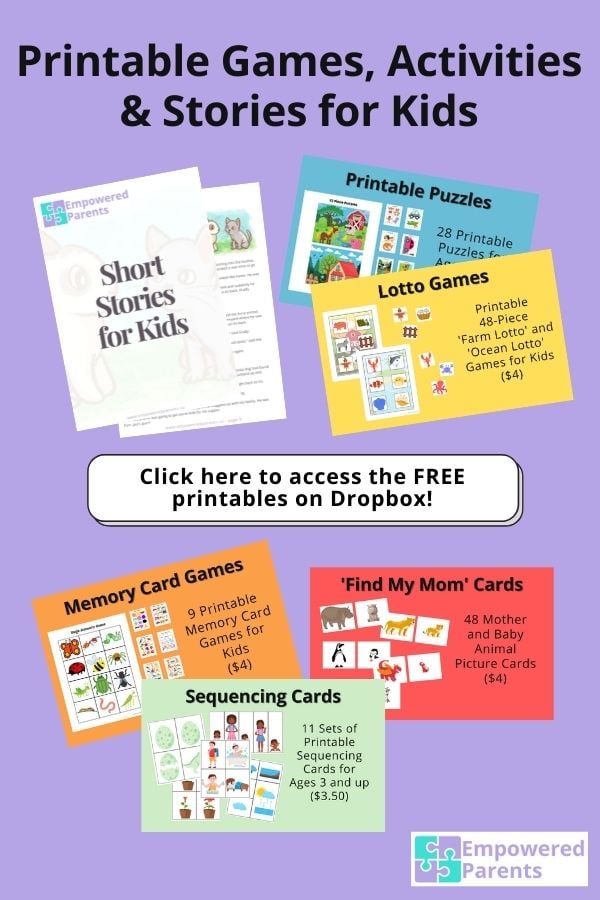
0 Response to "Easy Finger Painting Ideas Paintings of a Sunflower"
Post a Comment